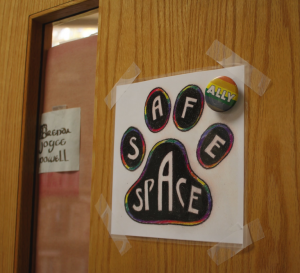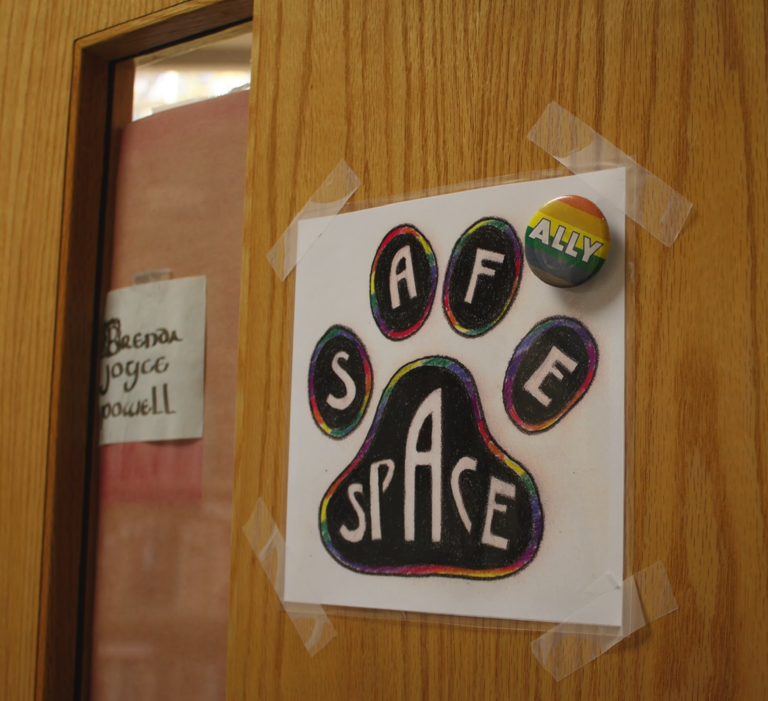Junior Ashe Allan, who identifies as queer, non-binary and transgender, has experienced being verbally harassed and called derogatory names while a student at St. Thomas. Allan, who does not identify as strictly male or female, said the university can be a difficult place to seek self-identity.
“It’s not a welcoming or supportive community for (transgender) people,” Allan said.
Allan’s experience lines up with results of the most recent campus climate survey conducted last spring. According to the survey, which polled faculty, staff and graduate and undergraduate students, respondents who identify as lesbian, gay, bisexual and transgender expressed higher rates of dissatisfaction with the university than their heterosexual counterparts. 
When presented with the statement, “Individuals on campus are treated equally, regardless of their sexual orientation,” 55 percent of LGBT students responded negatively, as opposed to the 17 percent of heterosexual students who responded negatively. LGBT students were also critical of equitable treatment, diversity-related experiences, diversity effectiveness, commitment and accountability.
Cara Anthony, the faculty adviser to the student-run UST Allies club, said there are many reasons LGBT students may feel unwelcome.
“I don’t want to speak on behalf of an identity that I don’t represent,” Anthony said. “But some of the very simple things (that can make students feel unwelcome) are things like, if I don’t fit into the categories set by society of male and female, which bathroom do I use?”
Anthony said the faculty-staff allies group, a body of St. Thomas faculty and staff members who are LGBT allies, have a meeting scheduled with President Julie Sullivan Monday.
Sullivan, who has been meeting with other affinity groups, said it will be a “get to know you” meeting, during which the group can share issues and concerns. Sullivan said the difficulties LGBT students face will be important to discuss with the faculty-staff allies group.
“I do want to really work on diversity and inclusion campus-wide,” Sullivan said. “I’m hoping to move forward with hiring a full time chief diversity officer who can help us with some of that education, so we’re all more aware of how our actions might be perceived by other people as potentially unwelcoming.”
Despite concerns, the campus climate has improved since the last survey was conducted in 2007. According to that survey, 83 percent of LGBT students did not believe individuals were treated equally on campus, regardless of sexual orientation.
Senior Brigetta Roden, president of St. Thomas’ Students For Marriage club, a group that supports traditional marriage between a man and a woman, said it is “unfortunate” that LGBT students do not feel welcome.
“The university is Catholic, so it has to proclaim what the Church believes; however, we want to do that in a loving way,” Roden said. “The gospel calls us to love everyone and to treat everyone with the dignity that they deserve as a human person.”
Despite the improvements, Allan and Anthony both think there is more work to be done.
“I think that a lot of students quietly and personally feel that being gay is not a bad thing … but they don’t say so,” Anthony said. “I think, being visible and being audible is important.”
Senior Danielle Tschida, president of the student UST Allies club, said there’s more St. Thomas can do to support LGBT students.
“I think UST has a long way to go to become a more diverse campus, but I think President Sullivan is making a good start at stating that we need to be more inclusive and accepting of other people,” Tschida said.
Grace Pastoor can be reached at 6138@stthomas.edu.




Great job Grace at providing factual information! As someone who is apart of the LGBT community at UST, I am hopeful for the initiative that President Sullivan is taking towards expanding our diversity education. Thank you for this article!